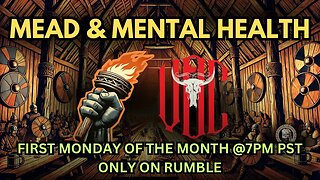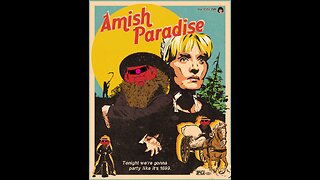Premium Only Content

Lesson 7: The Days of the Week 051619
The Bible Show
Lesson 7: The Days of the Week / Idolatry
05/16/2019
01.) Exodus 20:1-5 (idolatry)
02.) Acts 17:15-16, 22 (idolatry)
03.) Job 31:26-28 (sun worship)
04.) Ezekiel 8:1-4, 15-18 (sun worship)
05.) Jeremiah 10:1-3 (be not dismayed at the signs of heaven)
06.) Amos 5:8 (seven stars of Orion)
07.) Job 9:2-5, 8-9 (Arcturus, Orion, and Pleiades)
08.) Revelation 22:12-15 (without are idolaters)
09.) Merriam-Webster Dictionary: Heathen - Of or relating to people or nations that do not acknowledge the God of the bible.
10.) KJV Bible Dictionary with Concordance: Heathen-see Gentiles; Gentiles - goy; plural goyim; is rendered Gentiles in the King James Verson in some 30 passages, but much more frequently heathen and oftener still nation, which latter is the usual rendering in the revised version (British and American), but is commonly used for the non-Israelitish people, and thus corresponds to the meaning of Gentiles.
11.) LiveScience.com
The Romans named the days of the week after their gods and corresponded to the five known planets plus the sun and moon (which the Romans also considered planets). To this day, all Romance languages (most familiarly Spanish, French, and Italian) still bear the mark of Roman day names, the exception being Sunday, which now translates to “Lord’s Day” and Saturday, which translates to "Sabbath."
Day Planet Latin Spanish French Italian
Sunday Sun Dies Solis domingo dimanche domenica
Monday Moon Dies Lunae lunes lundi lunedi
Tuesday Mars Dies Martis martes mardi martedi
Wednesday Mercury Dies Mercurii miércoles mercredi mercoledì
Thursday Jupiter Dies Jovis jueves jeudi giovedi
Friday Venus Dies Veneris viernes vendredi venerdì
Saturday Saturn Dies Saturni sábado samedi sabato
Germanic adaptations
The English words for each day bear remnants of Roman tradition, but they have been filtered through centuries of Germanic and Norse mythos. The Germanic people adapted the Roman system by identifying Roman gods with their own deities.
Sunday comes from Old English “Sunnandæg," which is derived from a Germanic interpretation of the Latin dies solis, "sun's day." Germanic and Norse mythology personify the sun as a goddess named Sunna or Sól.
Monday likewise comes from Old English “Mōnandæg,” named after Máni, the Norse personification of the moon (and Sól's brother).
Tuesday comes from Old English “Tīwesdæg,” after Tiw, or Tyr, a one-handed Norse god of dueling. He is equated with Mars, the Roman war god.
Wednesday is "Wōden's day." Wōden, or Odin, was the ruler of the Norse gods' realm and associated with wisdom, magic, victory and death. The Romans connected Wōden to Mercury because they were both guides of souls after death. “Wednesday” comes from Old English “Wōdnesdæg.”
Thursday, "Thor's day," gets its English name after the hammer-wielding Norse god of thunder, strength and protection. The Roman god Jupiter, as well as being the king of gods, was the god of the sky and thunder. “Thursday” comes from Old English “Þūnresdæg.”
Friday is named after the wife of Odin. Some scholars say her name was Frigg; others say it was Freya; other scholars say Frigg and Freya were two separate goddesses. Whatever her name, she was often associated with Venus, the Roman goddess of love, beauty and fertility. “Friday” comes from Old English “Frīgedæg.”
As for Saturday, Germanic and Norse traditions didn’t assign any of their gods to this day of the week. They retained the Roman name instead. The English word “Saturday” comes from the Anglo-Saxon word “Sæturnesdæg,” which translates to “Saturn’s day.”
12.) Crowl.org
http://www.crowl.org/Lawrence/time/days.html
Meanings of the Names of the Days
The Seven Day Week
The Naming of the Days
Sunday -- Sun's day
Monday -- Moon's day
Tuesday -- Tiu's day
Wednesday -- Woden's day
Thursday -- Thor's day
Friday -- Freya's day
Saturday -- Saturn's day
Sources
See Also
The Seven-Day Week
The Babylonians marked time with lunar months. They proscribed some activities during several days of the month, particularly the
first -- the first visible crecent,
seventh -- the waxing half moon,
fourteenth -- the full moon,
nineteenth -- dedicated to an offended goddess,
twenty-first -- the waning half moon,
twenty-eigth -- the last visible crecent,
twenty-nineth -- the invisible moon, and
thirtieth (possibly) -- the invisible moon.
The major periods are seven days, 1/4 month, long. This seven-day period was later regularized and disassociated from the lunar month to become our seven-day week.
The Naming of the Days
The Greeks named the days week after the sun, the moon and the five known planets, which were in turn named after the gods Ares, Hermes, Zeus, Aphrodite, and Cronus. The Greeks called the days of the week the Theon hemerai "days of the Gods". The Romans substituted their equivalent gods for the Greek gods, Mars, Mercury, Jove (Jupiter), Venus, and Saturn. (The two pantheons are very similar.) The Germanic peoples generally substituted roughly similar gods for the Roman gods, Tiu (Twia), Woden, Thor, Freya (Fria), but did not substitute Saturn.
Sunday -- Sun's day
Middle English sone(n)day or sun(nen)day
Old English sunnandæg "day of the sun"
Germanic sunnon-dagaz "day of the sun"
Latin dies solis "day of the sun"
Ancient Greek hemera heli(o)u, "day of the sun"
Monday -- Moon's day
Middle English monday or mone(n)day
Old English mon(an)dæg "day of the moon"
Latin dies lunae "day of the moon"
Ancient Greek hemera selenes "day of the moon"
Tuesday -- Tiu's day
Middle English tiwesday or tewesday
Old English tiwesdæg "Tiw's (Tiu's) day"
Latin dies Martis "day of Mars"
Ancient Greek hemera Areos "day of Ares"
Tiu (Twia) is the English/Germanic god of war and the sky. He is identified with the Norse god Tyr.
Mars is the Roman god of war.
Ares is the Greek god of war.
Wednesday -- Woden's day
Middle English wodnesday, wednesday, or wednesdai
Old English wodnesdæg "Woden's day"
Latin dies Mercurii "day of Mercury"
Ancient Greek hemera Hermu "day of Hermes"
Woden is the chief Anglo-Saxon/Teutonic god. Woden is the leader of the Wild Hunt. Woden is from wod "violently insane" + -en "headship". He is identified with the Norse Odin.
Mercury is the Roman god of commerce, travel, theivery, eloquence and science. He is the messenger of the other gods.
Hermes is the Greek god of commerce, invention, cunning, and theft. He is the messenger and herald of the other gods. He serves as patron of travelers and rogues, and as the conductor of the dead to Hades.
Thursday -- Thor's day
Middle English thur(e)sday
Old English thursdæg
Old Norse thorsdagr "Thor's day"
Old English thunresdæg "thunder's day"
Latin dies Jovis "day of Jupiter"
Ancient Greek hemera Dios "day of Zeus".
Thor is the Norse god of thunder. He is represented as riding a chariot drawn by goats and wielding the hammer Miölnir. He is the defender of the Aesir, destined to kill and be killed by the Midgard Serpent.
Jupiter (Jove) is the supreme Roman god and patron of the Roman state. He is noted for creating thunder and lightning.
Zeus is Greek god of the heavens and the supreme Greek god.
Friday -- Freya's day
Middle English fridai
Old English frigedæg "Freya's day"
composed of Frige (genetive singular of Freo) + dæg "day" (most likely)
or composed of Frig "Frigg" + dæg "day" (least likely)
Germanic frije-dagaz "Freya's (or Frigg's) day"
Latin dies Veneris "Venus's day"
Ancient Greek hemera Aphrodites "day of Aphrodite"
Freo is identical with freo, meaning free. It is from the Germanic frijaz meaning "beloved, belonging to the loved ones, not in bondage, free".
Freya (Fria) is the Teutonic goddess of love, beauty, and fecundity (prolific procreation). She is identified with the Norse god Freya. She is leader of the Valkyries and one of the Vanir. She is confused in Germany with Frigg.
Frigg (Frigga) is the Teutonic goddess of clouds, the sky, and conjugal (married) love. She is identified with Frigg, the Norse goddess of love and the heavens and the wife of Odin. She is one of the Aesir. She is confused in Germany with Freya.
Venus is the Roman goddess of love and beauty.
Aphrodite (Cytherea) is the Greek goddess of love and beauty.
Saturday -- Saturn's day
Middle English saterday
Old English sæter(nes)dæg "Saturn's day"
Latin dies Saturni "day of Saturn"
Ancient Greek hemera Khronu "day of Cronus"
Saturn is the Roman and Italic god of agriculture and the consort of Ops. He is believed to have ruled the earth during an age of happiness and virtue.
Cronus (Kronos, Cronos) is the Greek god (Titan) who ruled the universe until dethroned by his son Zeus.
-
 1:05:32
1:05:32
Donald Trump Jr.
11 hours agoNews Not Noise, Live with Power the Future's Daniel Turner | TRIGGERED Ep.231
160K79 -
 28:01
28:01
Side Scrollers Podcast
3 hours agoNEW SERIES! Smash JT Has a Full-On Meltdown | Nerd Duel ft. Lady Desiree & You, Me & The Movies
23.2K2 -
 DVR
DVR
I_Came_With_Fire_Podcast
6 hours agoMEAD & MENTAL HEALTH WITH I CAME WITH FIRE AND VOC!!!
26.4K2 -
 1:10:04
1:10:04
John Crump Live
3 hours ago $1.77 earnedYes I talked To The ATF
23.4K3 -
 LIVE
LIVE
Amish Zaku
5 hours agoVerDanceKey Warzone - Birthday Fun
266 watching -
 LIVE
LIVE
NeoX5
3 hours agoKhazan: The Road Less Taken | Part 5-2 | Rumble Studio | Rumble Gaming
154 watching -
 LIVE
LIVE
TwinGatz
9 hours ago🔴LIVE - He Is Doing His Best | ARMA Reforger
284 watching -
 54:40
54:40
LFA TV
13 hours agoSee God in the Trade War | TRUMPET DAILY 4.7.25 7PM
49K10 -
 1:18:30
1:18:30
Sarah Westall
6 hours agoNew Study: EMFs Literally Put You into a Brainwave Cage; Reclaiming your Mind w/ Ian & Philipp
66.5K17 -
 35:54
35:54
SantaSurfing
6 hours ago4/7/2025 - Trump Tariff impacts - he wants no Capital Gains Tax! Inflation falls to 1.22%!
37.8K25